- Home
- David Pilling
The Wolf Cub Page 5
The Wolf Cub Read online
Page 5
His master tutted, and gave a sad little shake of the head. “You are dull of wit, Will. We stand or fall together, not for individual profit. Sell the horse at market, by all means, but the money from the sale will be shared among us. Better still, it can go into my strong-box, to be used as funds in the hard times to come.”
A mutter of approval greeted this. Will’s broken teeth flashed in a snarl. “Curse you, priest,” he rasped. “You mean to rob me!”
Stafford didn’t move a muscle as Will reached for his hatchet.
An arrow punched through his chest. Will jerked, and his mouth gaped wide in a silent scream.
I looked to the gate, where the arrow had come from. It was loosed by the toothless, black-bearded sentry, who exposed his filthy gums and raised his bow in salute.
Stafford nodded gravely at him. “My thanks, Stephen,” he said. “Your timing was immaculate.”
Silence reigned among the outlaws as Will choked out his last breath. I felt no pity for him, only terror at the nightmare I had stumbled into.
The indifference on the faces of the dying man’s comrades, if I can call them that, only made it worse. A couple of them started to lay wagers on how long Will would last.
At last he was still, and Stafford ordered Long Hugh and another man to take his body into the forest. “Bury him deep,” he said, “else the carrion-eaters will dig him up. He was our friend once. We owe him that much.”
“What of the horse, my lord?” I asked cautiously, in the slight hope that Stafford would return him to me. He was a far nobler creature than any of the few spindly horses I could see in the stable beside the long-house, and would be invaluable when the time came to make my escape.
Stafford gave me a shrewd look. I think he had guessed my intention.
“The horse has caused me a deal of trouble,” he said, “and the loss of one of my men. More than he is worth. An eye for an eye, John Page.”
He rubbed his hands. “I grow weary of venison and rabbit meat. There is good eating on this knightly charger. We shall feast on him tonight. You can enjoy the finest cuts, as part of your welcome to the greenwood.”
5.
Being forced to eat my own horse wasn’t the end of my trials. Stafford needed to judge if I was worthy to join his little band of heretics. To that end he took me with him on their next raid, the day after the feast.
My guts were still boiling from the lumps of blackened and bloody horse-flesh I had made myself swallow, and the thick, vile-smelling ale that washed them down. Stafford, who also drank deep, was as fresh as a newborn lamb. He possessed extraordinary strength and stamina for such a weak-looking man, and always led by example. These traits, combined with his superior intellect and utter ruthlessness, made him a formidable chief. If he had chosen a different path in life, he might have become a great captain of routiers.
That morning we rode out under light rain and heavy, charcoal-grey dawn skies. We had a dozen horses between us, all stolen, and none in very good condition. The outlaws were a slovenly lot, and took no better care of their beasts than themselves.
“Remember,” Stafford told us, “you know me as Robert Stafford, but in the wider world I am Frere Tuk. Let our enemies hear that name.”
He still wore his monkish habit, hitched up to his bare calves. Over it he wore a brigandine, a sleeveless leather tunic lined with small oblong steel plates, and an iron cap on his head. His followers wore bits and pieces of armour, again no doubt stolen from their rightful owners: bowl helmets, round shields, brigandines and rusted mail hauberks.
I carried nothing save my sword, which Long Hugh had returned. Stafford let me keep my fur-lined cloak, an act of generosity that caused several of the outlaws to exchange dark looks. After the death of Will, none cared to protest.
We were a scarecrow crew, though little worse than some of the poorer mercenary companies I later knew in Germany and Italy. Stafford was every bit as savage as any of the captains I have encountered, and just as calculating. He saw himself as no mere wolfshead, concerned with plunder and survival and little else, but a king in waiting.
Stafford took us out of the encampment on foot, and along hidden paths in the deep forest beyond. When we reached the highway, he gave the order to mount.
The road was unfamiliar to me, and he insisted on absolute silence. We rode at a canter, with him in the lead, taking no heed of the few startled farmers and drovers we met at such an early hour. They and their beasts scattered from our path, though one poor shepherd’s lad, too slow to get out of the way, was ridden down and trampled.
The man who rode over him - it was Long Hugh - laughed out loud at the deed. I silently cursed him, and added it to the list of crimes I had sworn to avenge.
Stafford was taking us into the forested vale of Arundel. The Earl of Arundel, John FitzAlan, was locked in a violent dispute over his inheritance with the Duke of Norfolk, and as a consequence his lands were ill-guarded.
We came to a part of the forest where the earl kept a number of deer parks, enclosed by ditches and earthen banks and topped with wooden palisades. The red deer could be seen peacefully cropping the lush grass inside, and scattered at the noise of our approach.
“Have those fences down,” ordered Stafford. Four of his men dismounted and set about smashing down the palisades with hammers and axes. The rest tethered their horses to nearby trees and strung their bows. These were proper war bows, capable of pinning a knight to the saddle through his layers of steel and leather, or bringing down a deer at two hundred yards.
The fence was broken, and our archers remounted and goaded their horses through the gaps. Stafford watched in mute approval as they spread out and rode after the deer-herds.
He kept me by his side. “You are of gentle blood,” he said, with another familiar pat of my hand, “born to lead, not follow. I have it mind to make you an officer. A Joshua to my Moses, eh?”
I forced a smile to my lips. “You honour me, my lord,” I replied.
He was very close, and carried only a bone-handled knife. I never saw him draw the knife, or handle any weapon in anger. Stafford relied on intellect and charisma to keep his rough followers in check. It was doubtful he even knew how to fight.
I, on the other hand, had been raised in a knightly family, and could think of a hundred ways to kill a man.
Perhaps shamefully, I resisted the urge. Stafford’s followers were too near, and I had no confidence of outrunning them on my miserable nag.
The outlaws returned with three fat does slung over the saddles of their horses. Stafford applauded their success, and flipped a silver penny from his purse to John Burnham, the dead-eyed archer of Chichester, who had brought down the deer.
That was not the end of the day’s work. Stafford knew the vale well, and led us into the earl’s warrens and chases. Here we poached a great number of deer, hares, pheasants and partridges.
As night drew on, and shadows flitted among the gnarled boughs of the trees, Stafford changed his tactics.
Near the edge of the chase, not far from Arundel Castle itself, were some timber lodges for the earl’s verderers and gamekeepers. Either these men weren’t very alert, or had chosen to hide in cowardly fashion while we ravaged their master’s lands.
It did them little good. Stafford waited until darkness had fallen, and then led us to the lodges.
“Leave the horses,” he ordered, “I want absolute silence, my friends. The first one of you to flap a tongue will lose it.”
The horses were tethered, and Stafford led us through the shadowy woods. He had good night vision, else we might have stumbled about in circles until daybreak.
His men had brought torches, wooden staves with the ends wrapped in rags soaked in sulphur and lime. Stafford waited until we were crouched in the undergrowth, some twenty yards from the thatched roofs of the rough timber huts, and raised his pale hand.
The outlaws worked swiftly with flint and tinder. Within moments the torches were alight. Then Long
Hugh rose to his feet and uttered a shout that echoed like a war-horn through the night.
“Frere Tuk!” he bellowed, “the lord of the Weald is upon you! God for Frere Tuk!”
His comrades sprang out of hiding and charged. Stafford seized my wrist and dragged me in his wake.
Most of the lodges were in darkness, though lights flickered at a couple of windows. More lights flared as we approached, and a door banged open.
A man appeared in the doorway, still in his night-shirt, blinking and rubbing his face. One of the outlaws halted, notched one of the terrible striped arrows, and took aim at him.
I, who had seen enough innocents murdered in the past two days, pretended to stumble and fell against the outlaw’s back. He dropped the arrow and gave me a volley of abuse. I mouthed an apology and ran past him, hoping to save a few more lives.
The outlaws hurled their torches onto the thatch, or else broke the shutters on the windows and tossed the brands inside. Screams and yells of fear erupted as the flames took hold. Wild-eyed and dishevelled men spilled out of the lodges and fled in all directions.
“Let the hunt begin!” cried Stafford, “a silver penny per head!”
He lifted the hunting horn that hung from a strap on his shoulder, and sounded a long blast. His men ran down the fugitives, overpowering all they could catch and chasing the rest into the trees.
Most of the gamekeepers were killed, their throats cut as they were pinned and held down on the grass. Stafford moved among the wanton butchery and picked out a few to be spared for ransom.
This wholesale poaching and murder was the sum total of Stafford’s strategy to conquer the Weald. He had no other plan that I could see, save to carry on breaking the law and waiting on further prophecies from his angel. The man was quite mad, and (so I thought) destined to end on the gallows or at the stake.
God reaches the faithful in many and various ways. I never expected to hear the truth drop from the lips of Robert Stafford, a man I secretly hated and feared in equal measure, but so I did.
The truth has stayed with me to this day. I have fought for it, betrayed my friends for it, and am prepared to burn for it. Even now, so many years later, I would likely die for it if these writings fell into the wrong hands. Christian hands, O Sultan, my supposed brothers of the faith.
I am ready. God’s truth is absolute, and flesh is but flesh after all.
6.
“The end of days,” said Stafford, “it is coming, my friends. All things will change, and mankind emerge into a cleaner, fresher dawn.”
We sat before him on the ground, cross-legged like so many schoolchildren, while he preached from the step of the long-house. His words were met with stifled murmurs and grunts of approval from his followers, who watched him with adoration in their eyes.
He spread his arms wide. “What is the Pope of Rome?” he cried.
“Antichrist!” the outlaws chanted in unison.
“Antichrist,” he repeated, “false in all his workings. I tell you, my friends, he has no more power of God in him than any other man. Nor has he the power to make bishops, priests or any other holy order.”
His voice rose. “All these grand titles, palaces, reliquaries, adornments and vestments the Pope and his acolytes adorn themselves with. All the wealth they seek to pile up on earth, as though they could use it as a stepladder to Paradise. All shall avail them nothing in the final reckoning. That man whom the people call Pope is naught but a false extortioner and deceiver!”
He paused, red-faced, while one of his acolytes handed him a cup of water. Not far off, I could hear the voices of the gamekeepers we had taken for ransom. They were held inside a pen, and turned to prayer to keep their spirits up.
Stafford had despatched a messenger to Arundel Castle with his ransom demands. The outraged constable responded by cutting off the messenger’s left hand and sending him back with the hand in a box. This foolish act of cruelty all but sealed the fate of the prisoners, and their prayers were heavy with despair.
The mutilated outlaw lay on a sickbed inside the long-house, dosed with juice of the poppy. Gangrene had set into his wound, and a dreadful stench drifted from inside.
Stafford ignored these interruptions and carried on regardless. His heavy sleeves fell down, exposing stick-thin white arms, as he raised his hands to Heaven.
“Who is the true Pope?” he demanded, “who is most holy and most perfect?”
“Those who live on earth,” the outlaws chorused. “Those who love freely.”
They were well-versed, and I gained the impression Stafford had recited this same sermon many times before. He knew his students were rough and uneducated serfs, and that the only way of drumming ideas into their heads was through the power of repetition.
“Indeed,” he said in a softer tone, “for those that are called priests, and serve Antichrist, are no priests at all, but lecherous and covetous men and deceivers of the people. Their false teachings and preachings are means by which they sustain their evil pride, their sloth and all their other vices. Even now the Pope’s creatures in England make new laws and ordinances, to oppress and murder those who oppose the vicious living of so-called churchmen.”
He smiled lovingly at a couple in the front row. They had just been married in a forest wedding. There were no vows spoken during the ceremony, if it can be called that, no prayers or hymns or liturgies, just a simple declaration of love and a feast afterwards.
“Those who love,” he continued, “and wish to live as man and wife, have no need of solemn vows, or some shaven-headed fool to mutter Latin phrases over them. For love comes direct from God, pure and divine, and must not be polluted by the interference of false priests.”
There was more in this vein. He spoke of the essential corruption of the church, and the duty of true priests to do no more than preach the scriptures and abide by their vows of poverty and humility.
After my initial shock at his blasphemies had passed, I found myself drawn to his words. From infancy I had been taught to respect the church, even though the naked greed and injustice of Christ’s servants on earth were all around me.
As an example, my mother’s late husband had been forced to pawn seven hides of land to Worth Abbey in order to raise enough money to buy horse and armour for his last campaign. The abbot showed no mercy to his widow, who could not redeem the pledge, and added those seven hides to the abbey’s already vast estates.
Some might say the abbot only took what was owed. I say a true man of God has no business trading in land and goods, like some common huckster, and profiting from the death of good knights.
Stafford was obviously a hypocrite, who preached a doctrine of love while committing the foulest crimes. Even so, his message was still worth listening to, and he was by no means the only man in England preaching it.
He was a Lollard of sorts, though he never used the term, one of the breed of heretics who followed the teachings of John Wycliffe. The Lollards travelled about the country like wandering friars, teaching the essential purity of the Bible and demanding an end to the tyranny and corruption of the church.
I was still young and idealistic then, and drank in Stafford’s heresies like honeyed ale. At the same time I quickly grew tired of his company, and of his band of ruffians, and bent all my thoughts towards escape.
For the time being I made a point of playing the good little caporale, obeying his every command with feigned enthusiasm. Thus, when King Henry’s army sailed for Normandy, I was still trapped in the Weald, shooting rabbits and teaching clods how to use a sword.
“We must demonstrate our strength,” Stafford told me in private, “and make the lords of Sussex tremble in their manors and castles. In time, when we have them in such a state of terror as to piss their drawers at the mere mention of Frere Tuk, they will renounce their allegiance to Henry Plantagenet and pledge loyalty to me.”
In his own fractured mind Stafford undoubtedly saw himself as the true King of England, not for his ow
n glory, but to ensure England’s salvation at the End of Days. He was certain the time was coming, and soon, when the heavens would open and showers of molten flame and ash pour forth, to cover the earth in fire and purge the sinful. To avoid God’s wrath it was essential that a righteous man, uncorrupted by the lies of Antichrist, sat on the English throne.
It was hard to think of a more unlikely saviour than Stafford, or a less worthy person to sit on the throne. Still, I simpered and grovelled before him, encouraged his insane ambitions, and obediently rode off to poach game and terrorise the local verderers.
I was careful to befriend his two best men, Long Hugh and John Burnham. Both were fearsomely strong, quick to learn swordplay, and Burnham was one of the finest archers I ever knew. As summer faded, I carefully cultivated these two, and played on their natural greed and viciousness.
They were slightly more intelligent than the rest of Stafford’s followers, and not content to follow him for much longer. I worked on them for weeks, breaking down their fear of the mad priest and dangling the promise of easy wealth before their eyes.
“Ride out with me on the next raid,” I suggested to them one evening near the end of August, “just us three.”
We sat around a supper fire, away from the others. I kept my voice low, and tried to sound brash and confident. All the while I was terrified lest my words were overheard and reported to Stafford. If the slightest hint of my plans reached his ears, he wouldn’t hesitate to have me killed.
My companions were just as wary. “Where to?” murmured Long Hugh, staring down at his bowl of bean and venison stew.
“North-west,” I replied, “out of Sussex, into Berkshire.”
Their gnarled, weather-beaten faces creased into puzzled frowns. “There is something in Berkshire that belongs to me,” I explained, “something of great personal value. You will profit as well. A rich manor. Chests of gold and silver taken from the French wars. More than enough for all three of us to roll in treasure for the rest of our lives.”

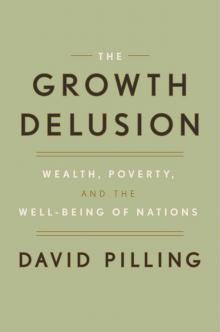 The Growth Delusion
The Growth Delusion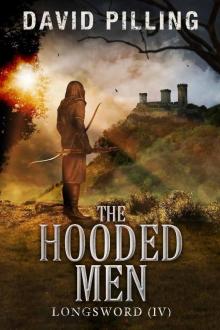 The Hooded Men
The Hooded Men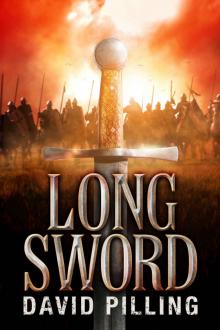 Longsword
Longsword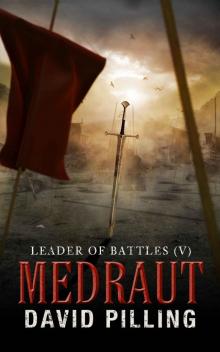 Medraut
Medraut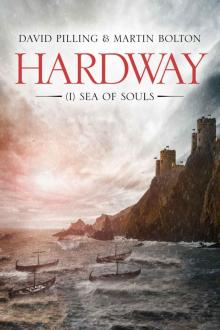 Hardway
Hardway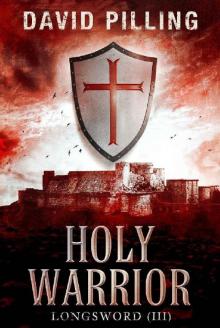 Holy Warrior
Holy Warrior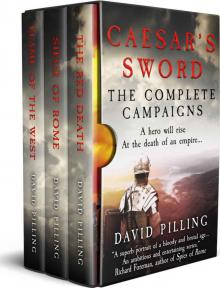 Caesar's Sword: The Complete Campaigns
Caesar's Sword: The Complete Campaigns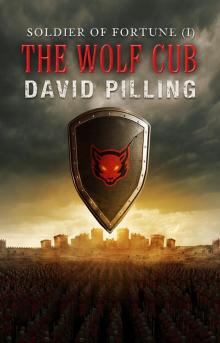 The Wolf Cub
The Wolf Cub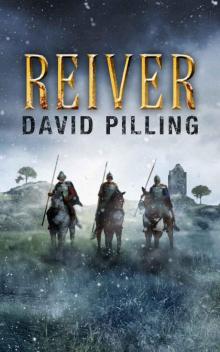 Reiver
Reiver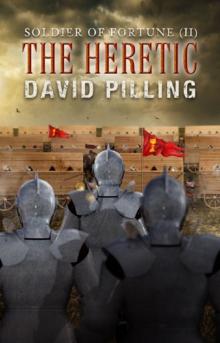 The Heretic
The Heretic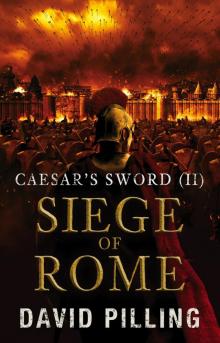 Siege of Rome
Siege of Rome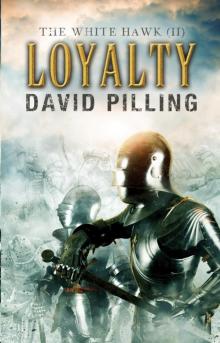 Loyalty
Loyalty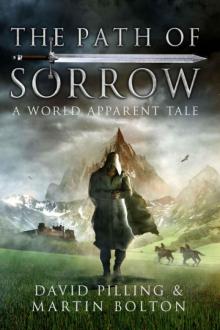 The Path of Sorrow
The Path of Sorrow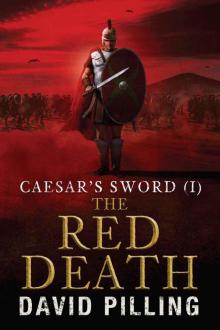 Caesar's Sword (I): The Red Death
Caesar's Sword (I): The Red Death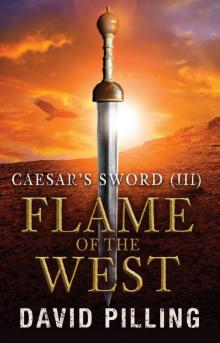 Flame of the West
Flame of the West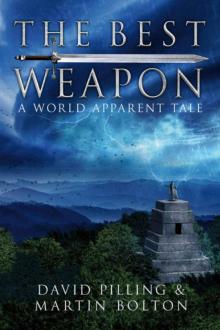 The Best Weapon
The Best Weapon Sacrifice
Sacrifice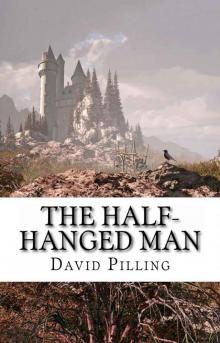 The Half-Hanged Man
The Half-Hanged Man